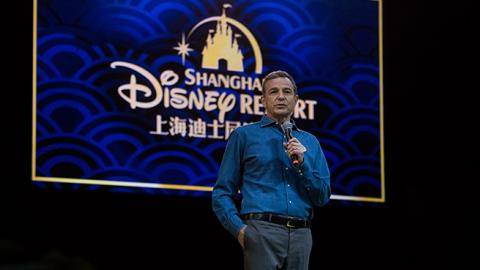p(firstLetter). On June 16, 2016 in Pudong, Shanghai, the Walt Disney Company opened its largest theme park ever. In his dedication speech, CEO Bob Iger described the $5.5 billion, 943-acre Shanghai Disneyland Park and Resort as a “happy place . . . created for everyone,” a world “of fantasy, romance and adventure,” a land of “magical dreams,” and “a source of joy, inspiration, and memories for generations to come.”
I don’t know about you, but after living in the United States these past few years, I could see spending a couple of weeks in a place like that.
There’s only one hitch. Of the park’s 11,000 full-time employees, 300 are active members of the Communist Party. They adorn their work sites with hammer-and-sickle insignia and spend several hours a week attending lectures and study sessions in the park’s “party activity center.” Not only that, but in the wake of the 19th Party Congress, these employees are now under added pressure to bring their colleagues into line with “Xi Jinping Thought.”
In the same speech, Iger characterized Shanghai Disneyland Park and Resort as “authentically Disney and distinctly Chinese.” This was, of course, a reference to the park’s cuisine (90 percent Asian) and décor (faux European jumbled with faux Chinese in a way bound to give spiritual dyspepsia to any visitor cursed with artistic taste or historical memory). But it was also a confession that the iconic Walt Disney Company, which for almost a century has symbolized the United States and its ideals, is kowtowing to the world’s most powerful autocrat.
The Magic Kingdom is hardly alone in groveling before the gates of the Middle Kingdom. Just this past week, Facebook CEO Mark Zuckerberg donned a jacket and tie to appear before Xi—and applauded a speech in which Xi stated that the purpose of education was to “train the builders and successors of socialism with Chinese characteristics, not bystanders and opponents.” Clapping along was Apple CEO Tim Cook, apparently in the same state of shock as other Silicon Valley wizards who, having been warmly welcomed to the PRC just a few years ago, are now being shown the exit.
Why are these tech wizards no longer welcome? Because by paying close attention (a.k.a. intellectual property rights theft), the Chinese have developed their own sophisticated digital technology, which the security services are now deploying to censor, propagandize, and surveil all those bystanders and opponents not in lockstep with what Xi calls “the glorious tradition of listening to the party’s words and following the party’s path.”
Because movies are not as easily replicated as software, a somewhat different story is playing out between China and the magicians of Hollywood. Dazzled by visions of vast new audiences flocking to shiny new theaters across China, the six major media conglomerates—National Amusements, Disney, Time Warner, Comcast, News Corp, Sony—have all gone through the same five-step process.
First, they lobbied to increase quotas on the import of foreign films to China. Second, they altered film content to satisfy the gatekeepers in Beijing. Third, they invited Chinese investment in Hollywood. Fourth, they partnered with Chinese firms to co-produce big-budget films aimed at the global market. And fifth, they agreed to make movies in China, where in exchange for allowing the party to tailor content, they get a bigger slice of the profits.
Apart from concerns expressed in Congress last year, this process has gone all but unremarked in the United States. When it is mentioned, most Americans shrug and say, hasn’t Hollywood been cutting deals with foreign governments since Day One, and always to its own advantage? It has indeed. But take a look at where these recent deals are leading: to the mighty American entertainment industry lending its resources and talents to the manufacture of propaganda aimed at strengthening the Chinese Communist Party’s grip on power. Walt Disney would roll over in his grave, if he had one.
Speaking of Walt, here’s another reason why Americans shrug at this particular company’s kowtowing to China. Ask a professor of film studies to use Disney and autocrat in a sentence, and you will not get a sentence about Xi Jinping. Instead, you will likely get a whole paragraph about Walt Disney being the autocrat—because when his underpaid employees organized a strike back in 1941, he accused them of being Communists. He also appeared as a “friendly witness” before the House Un-American Activities Committee in 1947, and later made anti-Soviet propaganda for the U.S. government.
The gist of this narrative is captured in the Guardian newspaper’s 2006 assertion that “kind Uncle Walt” was really “an uncaring husband, bullying boss and rabid anti-communist witch-hunter.” Not just in academia and Hollywood but throughout blue-state America, the same people who would pass this judgment on Disney would also have us believe that there were no Communists in America during the 1930s, and that the Soviet Union posed no real threat in the years following World War II. From this surprisingly tenacious perspective, it was Walt, not the Left, who was living in Fantasyland.
The first Disney product to penetrate China was Snow White and the Seven Dwarfs, which opened in Shanghai in June 1937, six months after its extraordinary success in America. A sentimental favorite today, Snow White was the Avatar of its time, in terms of labor, stress, cost, missed deadlines, predictions of disaster—and, in the end, total triumph.
It also inspired the Wan brothers, China’s pioneering animation team, to create that country’s first feature-length animated film, Princess Iron Fan. The Wans’ film appeared in 1941, but any further development of a distinctive Chinese style of animation was thwarted by a succession of traumas: war with Japan, revolution, civil war, famine, mass poverty, “cultural revolution,” and political repression.
Fortunately for the Chinese people, the post-Mao era has brought relief from all of these traumas—except the last. Under Xi, the Communist Party is pushing for a return to “the core values of socialism,” and a rooting out of such “false ideological trends” as constitutional democracy, civil society, unregulated markets, a free press, critical historiography, and political dissent.1 What this means, according to Duncan Hewitt of Newsweek, is that the writing is now on the wall for the compliant magicians of Hollywood:
In April an article in China’s official army newspaper denounced Disney’s Zootopia, a big hit at China’s box office, as U.S. propaganda, saying it reflected twisted values and distorted the natural order of the animal world, by presenting wolves as victims and a sheep as a villain. Such irreverence for the natural order was a dangerous trend, the paper said, and it encouraged soldiers not to watch such movies. One well-known actor even made a public appeal to young people not to attend Disneyland since it represented “pure American values.”
That may be too great a compliment, given that Jiminy Cricket is now in Shanghai, singing, “When you wish upon a (red) star…”

















